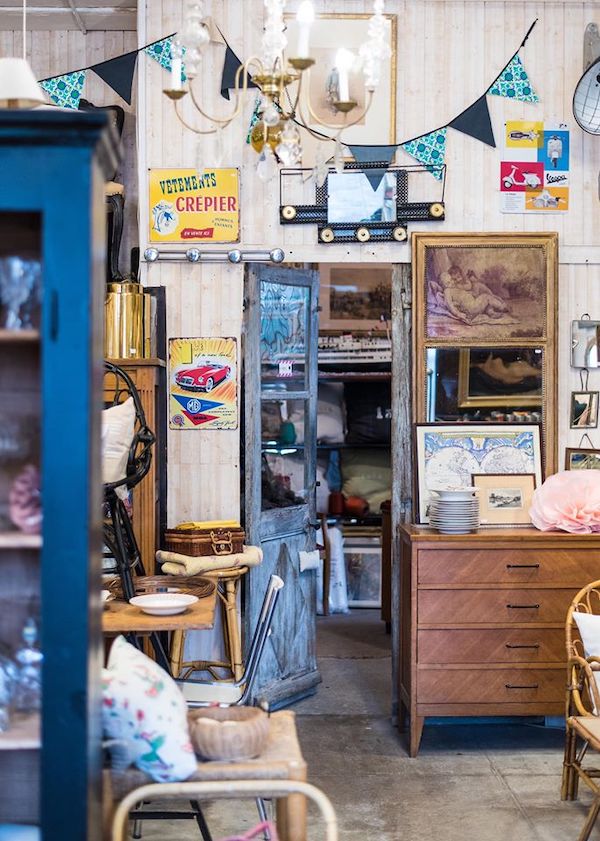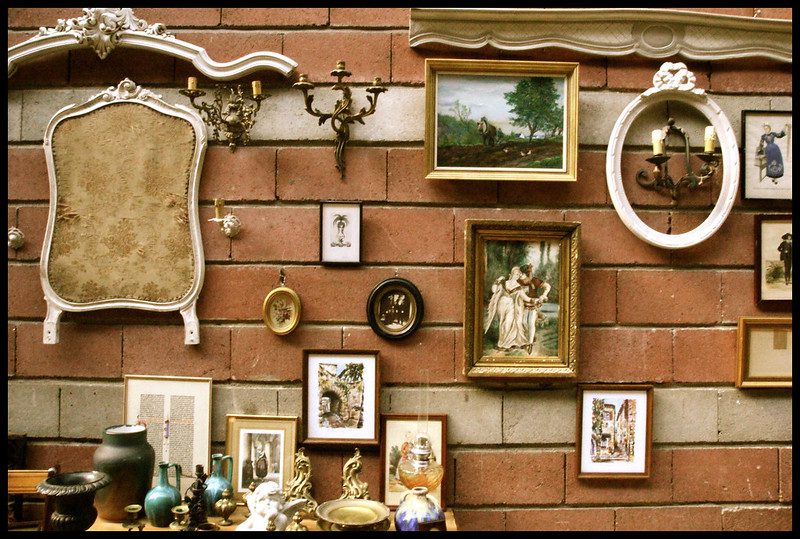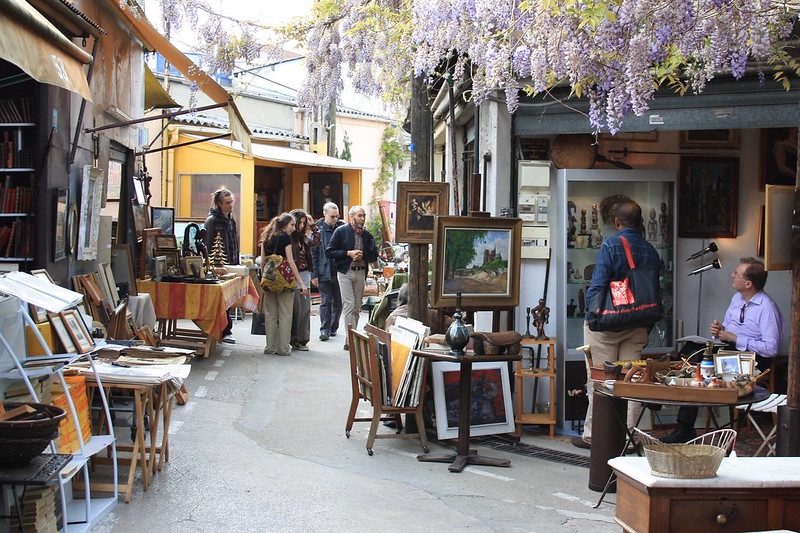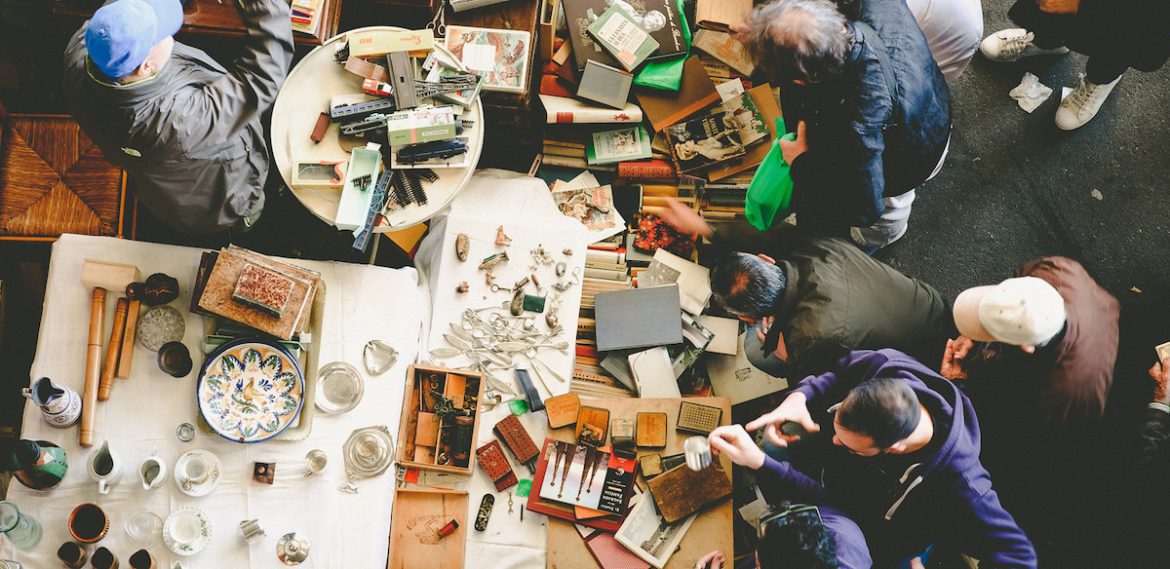Marchander, négocier, discuter le prix, trouver un terrain d’entente, chicaner, barguigner… These are just a few of the words for “haggling” you could hear while scouring for vintage finds in France. Here, we’ve put together a petite guide of need-to-know French antiques vocabulary, so you have the best chance of nabbing some great vintage finds.
SUBSCRIBE TO THE MAGAZINE
Check it out below!

The first thing to know is what kind of sale you’re attending and what kind of French antique shopping it will be. If you’re strolling through the streets of a town or village, you are probably en train de chiner (browsing for bargains) in a foire à tout (car boot sale). If you are in a garden, maybe with access to a barn or attic, you are most likely in a vide-grenier (yard sale, literally translating to “empty attic”) – here you can usually find pre-loved clothes, kitchenware, toys, books, old furniture and the like. Antiquaires or brocanteurs are more established shops, both of which sell antiques, the difference being antiquaires typically carry older, more expensive wares (whose origins they should be able to certify).

Once inside a sale, it will help to understand common descriptions for French antiques, such as dans son jus and dans l’état, both of which mean that the object has not been renovated (and may even be sporting its original cobwebs!). A renovated object would be described as remis à neuf or rénové.
Eager buyers are known to congregate au cul du camion, which refers to swarming a seller’s car before he or she has even been able to unwrap their goods. You might find people rummaging through the trunk, emptying it as they reach for a promising find (the seller will usually stand by with a bemused expression, observing the fervor and perhaps granting deals to the most dynamic of unpackers).

Professionals seekers of French antiques, a more stately and exclusive group, have buying sessions reserved just for them, referred to as les déballages (unpackings). However, don’t think that simply knowing this term will grant you access to these wares – a permis (license) is required to prove you belong in this select group.
Slightly outside the mainstream venues for nabbing French antiques are les ventes aux enchères (sales by auction). Such events occur regularly across France but are less popular and known about in comparison to the more casual brocantes and foires à tout.

This is perfectly reflected by the French expression for a sale by auction: vente sous le manteau (under the coat sale). These are conducted by a commissaire-priseur, who you’ll hear acknowledge a bid by saying “j’ai preneur à” (“I have a taker at”), then: “qui dit mieux?” (“who says better?”), a phrase that encourages others buyers to top it. The winner is rewarded with the final sentence: “adjugé, vendu” (“awarded, sold”)!
This short vocabulary guide should provide you with some useful terms and lines to use the next time you’re browsing for French antiques (but be aware of the risk of knowing complete sentences by heart: giving the impression that you are fluent!):
French Antiques Sales Vocabulary
Brocanteur / brocante – antiques shop
Marche aux puces (or les Puces) – flea markets
Foire à tout – car boot sale
Vide-grenier – yard sale
Vente sous le manteau – “under the coat” sale
Commissaire-priseur – auctioneer (conductor of a vente sous le manteau)
Les ventes aux enchères – auction sales
Les déballages – unpackings
En train de chiner – browsing for bargains
Antiquaire – seller of antiques, will certify objects’ origins
Brocanteur – seller of antiques, won’t often certify objects’ origins
Permis – license
Dans son jus / dans l’état – meaning the object has not been renovated
Remis à neuf / rénové – meaning the object has been renovated
Au cul du camion – the act of swarming a seller’s car before he or she has been able to unwrap their wares
French Antiques Sales Phrases
“J’ai preneur à…” – “I have a taker at…”
“Qui dit mieux?” – “who says better?”
“Adjugé, vendu” – “awarded, sold!”
Common French Antiques Vocabulary
Drap de table en lin – linen tablecloth
Serviettes en lin – linen napkins
Draps en lin – linen sheets
Couverts – tableware
Porcelaine – porcelain
Ensemble de porcelaine – China
Cuivre – copper
Verre – verre
Peinture – painting
Objet décoratif – decorative object
Vase – vase
Lampe – lamp
Commode – dresser
Malle – trunk
Bougeoir – candlestick holder
Vêtements – clothing
Bijoux – jewelry
Boîte à bijoux – jewelry box
Miroir – mirror
Plateau – tray
